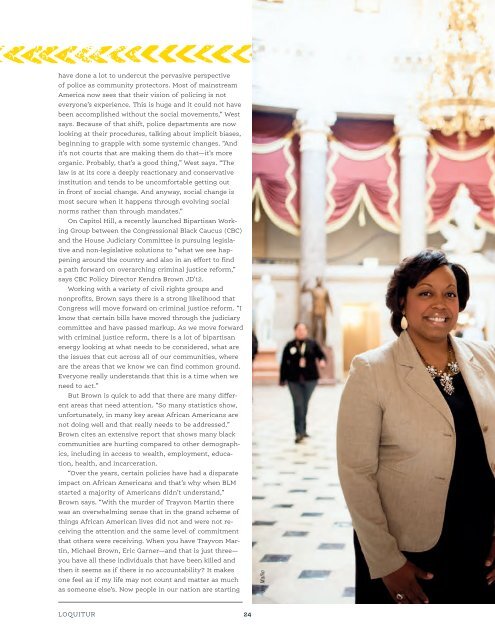In search of justice
fall2016_web
fall2016_web
You also want an ePaper? Increase the reach of your titles
YUMPU automatically turns print PDFs into web optimized ePapers that Google loves.
have done a lot to undercut the pervasive perspective<br />
<strong>of</strong> police as community protectors. Most <strong>of</strong> mainstream<br />
America now sees that their vision <strong>of</strong> policing is not<br />
everyone’s experience. This is huge and it could not have<br />
been accomplished without the social movements,” West<br />
says. Because <strong>of</strong> that shift, police departments are now<br />
looking at their procedures, talking about implicit biases,<br />
beginning to grapple with some systemic changes. “And<br />
it’s not courts that are making them do that—it’s more<br />
organic. Probably, that’s a good thing,” West says. “The<br />
law is at its core a deeply reactionary and conservative<br />
institution and tends to be uncomfortable getting out<br />
in front <strong>of</strong> social change. And anyway, social change is<br />
most secure when it happens through evolving social<br />
norms rather than through mandates.”<br />
On Capitol Hill, a recently launched Bipartisan Working<br />
Group between the Congressional Black Caucus (CBC)<br />
and the House Judiciary Committee is pursuing legislative<br />
and non-legislative solutions to “what we see happening<br />
around the country and also in an effort to find<br />
a path forward on overarching criminal <strong>justice</strong> reform,”<br />
says CBC Policy Director Kendra Brown JD’12.<br />
Working with a variety <strong>of</strong> civil rights groups and<br />
nonpr<strong>of</strong>its, Brown says there is a strong likelihood that<br />
Congress will move forward on criminal <strong>justice</strong> reform. “I<br />
know that certain bills have moved through the judiciary<br />
committee and have passed markup. As we move forward<br />
with criminal <strong>justice</strong> reform, there is a lot <strong>of</strong> bipartisan<br />
energy looking at what needs to be considered, what are<br />
the issues that cut across all <strong>of</strong> our communities, where<br />
are the areas that we know we can find common ground.<br />
Everyone really understands that this is a time when we<br />
need to act.”<br />
But Brown is quick to add that there are many different<br />
areas that need attention. “So many statistics show,<br />
unfortunately, in many key areas African Americans are<br />
not doing well and that really needs to be addressed.”<br />
Brown cites an extensive report that shows many black<br />
communities are hurting compared to other demographics,<br />
including in access to wealth, employment, education,<br />
health, and incarceration.<br />
“Over the years, certain policies have had a disparate<br />
impact on African Americans and that’s why when BLM<br />
started a majority <strong>of</strong> Americans didn’t understand,”<br />
Brown says. “With the murder <strong>of</strong> Trayvon Martin there<br />
was an overwhelming sense that in the grand scheme <strong>of</strong><br />
things African American lives did not and were not receiving<br />
the attention and the same level <strong>of</strong> commitment<br />
that others were receiving. When you have Trayvon Martin,<br />
Michael Brown, Eric Garner—and that is just three—<br />
you have all these individuals that have been killed and<br />
then it seems as if there is no accountability? It makes<br />
one feel as if my life may not count and matter as much<br />
as someone else’s. Now people in our nation are starting<br />
Jay Mallin<br />
LOQUITUR 24


